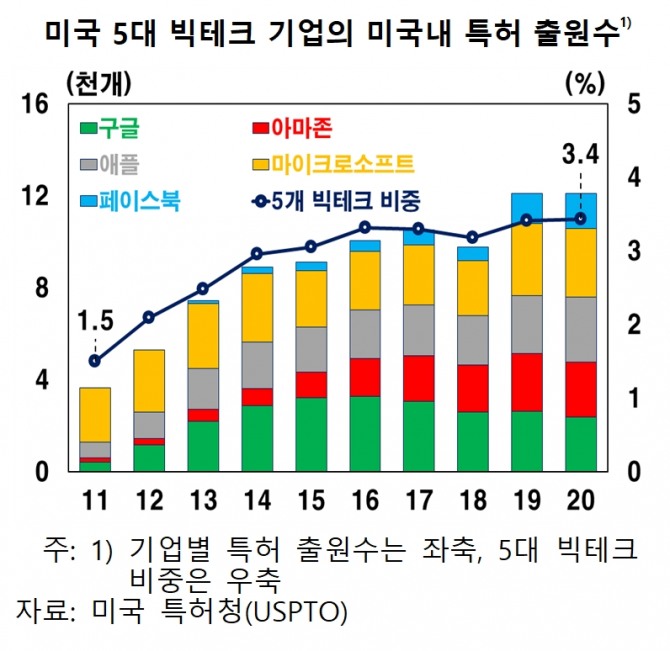
As the market dominance of big tech in the United States has recently expanded, the need for antitrust regulations to regulate its abuse has emerged, and it has been analyzed that this can have a direct or indirect impact on Korean companies.
According to the Bank of Korea on the 21st, as non-face-to-face transactions were intensifying due to the Corona 19 incident, the market power of Big Tech was further strengthened. Accordingly, while criticism that big tech is damaging the free market economy is rising, antitrust regulations by the US government and Congress are intensifying.
“The major big tech in the United States grew rapidly in the 2010s based on the characteristics of the digital economy and market dominance,” said Eun. In fact, major big techs such as Google (online search), Microsoft (PC operating system), Apple (mobile operating system), Facebook (SNS), Amazon (e-commerce) occupy more than half of each market.”
Based on this market dominance, sales of the five big techs grew by an annual average of 19.0% in the 2010s, and sales in 2020 increased more than five times compared to 2010.
In October of last year, the US House of Representatives investigated the monopoly of four big techs, including Google, Apple, Facebook, and Amazon, and reported that these companies undermined entrepreneurship through unfair behavior and infringed on consumer rights, freedom of the press, and privacy. did. Since then, the Ministry of Justice and the Fair Trade Commission (FTC) filed an antitrust lawsuit against Google and Facebook in collaboration with state and local prosecutors based on the results of the House’s investigation and its own investigation.
With the inauguration of the Biden administration, the Democratic Party’s domination of the Senate and House of Representatives, and the recent signs of a change in the philosophy of competition policy, antitrust regulations on big tech are expected to be pushed further in the future.
Looking at the ripple effect of antitrust regulation, first of all, regulatory uncertainty is expected to act as a factor that lowers the corporate value of Big Tech in the medium to long term. In addition, antitrust regulations act as a positive factor for innovation by easing barriers to market entry for new companies, but there is a risk of suppressing big tech’s innovation incentives.
In addition, antitrust regulations are likely to hinder the network effect and limit consumer welfare, but in terms of mitigating the distortion of the market structure, it is expected to be positive for improving consumer welfare.
“As the monopoly of Big Tech has a significant impact on technological innovation and consumer welfare, there is a possibility that the antitrust regulation on Big Tech will be further strengthened in the future.” There is considerable uncertainty in the outcome of the lawsuit, as it takes this time and there are many opinions against the regulation. As the US’s move to strengthen antitrust regulations can directly or indirectly affect Korean companies, it is necessary to pay attention to the strengthening of antitrust regulations by the US government and Congress.”
In Korea, it is pointed out that as big tech companies enter the financial industry, an unfair competitive environment is being created accordingly. If a big tech company and an existing financial company do similar business, the regulation will be relaxed and applied to the big tech company.
An industry insider said, “It is unreasonable for big-tech companies to do similar tasks, but if relaxed regulations are applied.”
Global Economic Reporter Baek Sang-il [email protected]